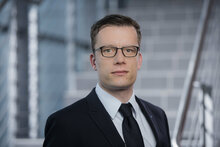Maria Niessen researches how computer programs process human language. “I translate between humans and computers,” says the 37-year-old and smiles. “This is very difficult for machines to do.” For two years now, Niessen is part of a team of computer scientists and cognitive scientists that has been researching on language comprehension in programming. They work at the Volkswagen Group IT Data Lab in Munich, the AI competence center in the Volkswagen Group.
To this end, Niessen and the team feed programs with data, which is the basis from which they learn, and correct them where necessary. This method is known as machine learning. The team researches systems which are not only able to recognize and classify language but also to identify and carry out the writer’s or speaker’s wishes. “This is of interest for many areas. For example, for customer dialog systems, or for voice control systems in the vehicle, when a driver or passenger requests information or multimedia entertainment,” explains Niessen.
But, as is so often the case, things that people can do very easily and intuitively – at least in their native language – are difficult for machines. And vice versa: computers solve differential equations in an instant, while humans find them much harder. Why is natural language a problem for machines, apart from grammar and vocabulary?
“We, the human users, want the machine to solve a problem or fulfill a wish,” Niessen explains. “The magic word is context. Within it, the program tries to extrapolate the meaning of the spoken or written word.” The team is currently working predominantly with texts – they are easier to analyze than the spoken word, and are not complicated by the idiosyncrasies of the speaker, for example, their dialect or speed of speech. Nonetheless, the programs have quite a lot to learn.
Requests for this service arrive from the entire Volkswagen Group, worldwide. “That’s what makes it so exciting,” says Niessen. “We can work with actual problems, and solve them too.” Whether it be the chatbot for internal orders, text analysis tools for IT, telephone services or user experience in the vehicle, Niessen and the team are quite busy. “We are a great team, and we want to achieve great things”, Niessen says. “For us, conditions are perfect: We are able to combine out scientific approach with the possibilities of a large corporation.”
Volkswagen at CEBIT 20218 (June 12 to 15)
In the Future Mobility Hall (Hall 25) at Cebit, the Volkswagen Group will be holding a forum for interested members of the public and experts with exciting presentations, first-class exhibits and interesting rounds of discussions and talks. There will be a wide range of topics, from new types of digital automobile design, research with quantum computing and trial blockchain projects to applied artificial intelligence within the company and data-backed traffic optimization in major European cities. There will also be a world premiere on the trade fair stand.
Volkswagen specialists in human resources marketing and start-up cooperation will also be available in Hall 27. They will talk about the wide variety of tasks within the company, career entry and cooperation possibilities to budding IT specialists and start-ups.
Note to the editors:
An elaborate portrait of Maria Niessen is available at https://www.volkswagenag.com/.
The series “IT-jobs at Volkswagen” is to be released continuously and regularly, including altogether 8 different jobs.







